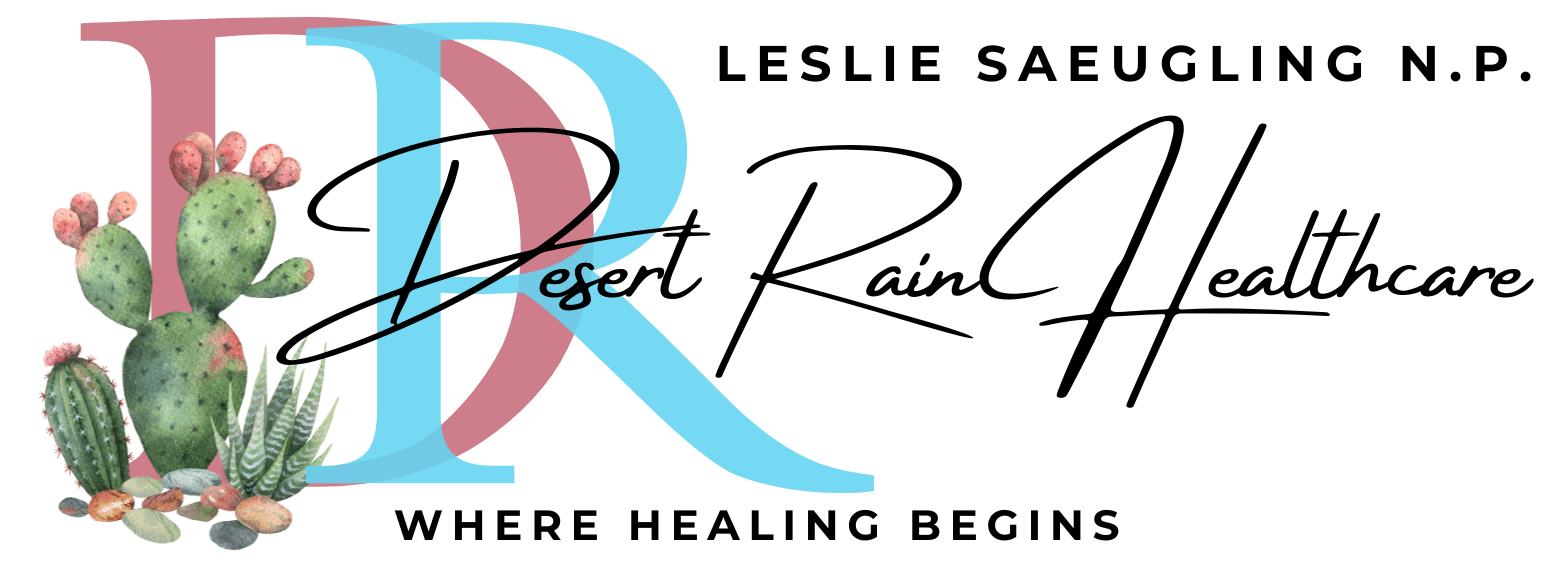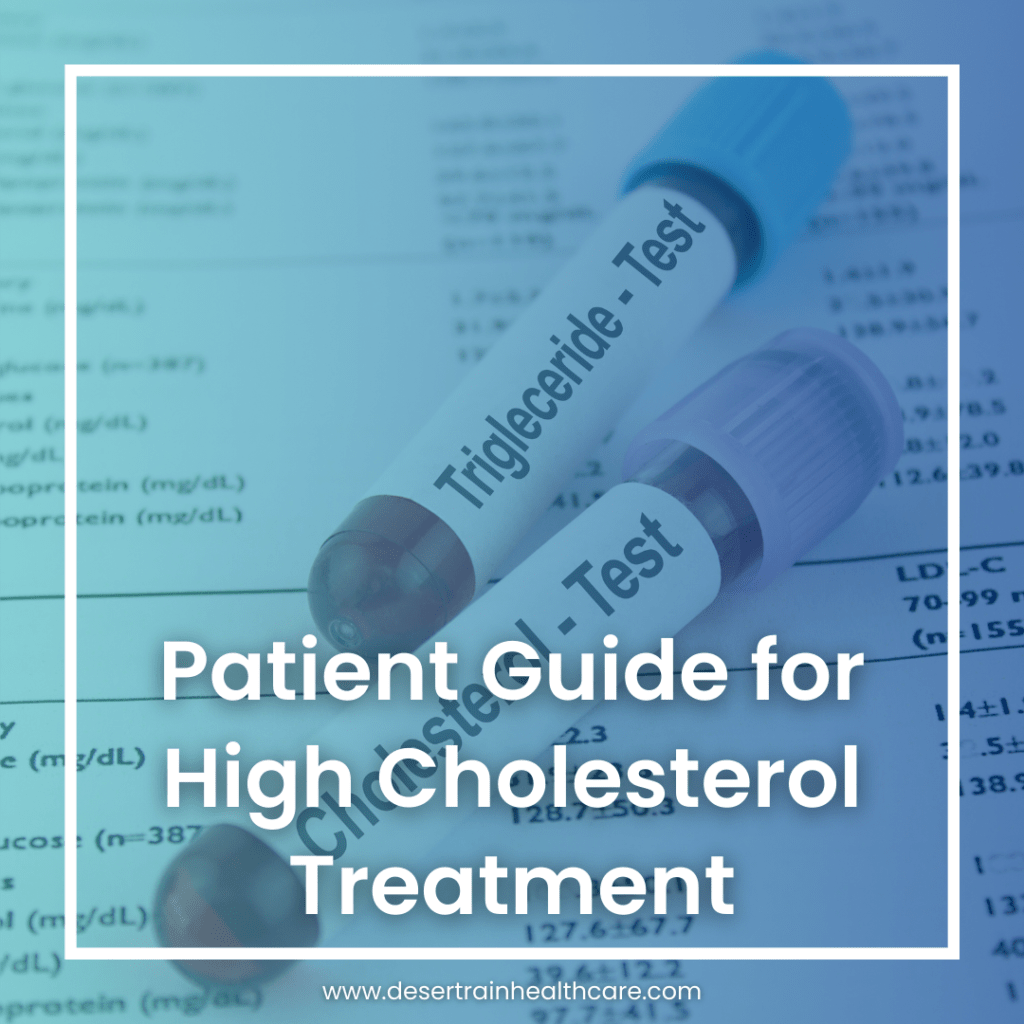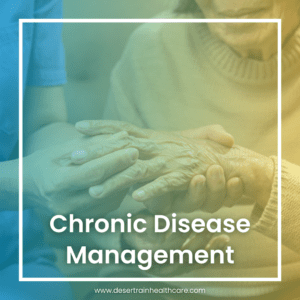High cholesterol is a common yet serious health condition that affects millions of people worldwide. It is a significant risk factor for heart disease, stroke, and other cardiovascular problems. Managing high cholesterol effectively requires a combination of lifestyle changes, medication, and regular medical supervision. This guide will provide you with essential information on high cholesterol, how to manage it, and the comprehensive care options available at Desert Rain Healthcare in Glendale, Arizona.
Understanding High Cholesterol
Cholesterol is a waxy, fat-like substance found in your blood. Your body needs cholesterol to build healthy cells, but having high levels of cholesterol can increase your risk of heart disease. High cholesterol can lead to the development of fatty deposits in your blood vessels, which can eventually make it difficult for blood to flow through your arteries. Sometimes, these deposits can break suddenly and form a clot that causes a heart attack or stroke.
Types of Cholesterol:
- Low-Density Lipoprotein (LDL): Often referred to as “bad” cholesterol, LDL carries cholesterol to your arteries. High levels of LDL cholesterol can lead to plaque buildup in your arteries, increasing your risk of heart disease.
- High-Density Lipoprotein (HDL): Known as “good” cholesterol, HDL helps carry cholesterol away from the arteries and back to the liver, where it is processed and removed from the body.
- Triglycerides: Another type of fat in your blood, high levels of triglycerides combined with high LDL or low HDL cholesterol can increase your risk of heart disease.
Causes and Risk Factors of High Cholesterol
Several factors can contribute to high cholesterol, including:
- Diet: Consuming saturated fats, trans fats, and cholesterol-rich foods can raise your cholesterol levels.
- Lack of Physical Activity: A sedentary lifestyle can lower HDL (good) cholesterol and increase LDL (bad) cholesterol.
- Obesity: Being overweight or obese is a risk factor for high cholesterol.
- Smoking: Smoking can lower your HDL cholesterol and damage your blood vessels, making them more prone to plaque buildup.
- Genetics: High cholesterol can run in families. Familial hypercholesterolemia is a genetic condition that causes very high cholesterol levels.
- Age: Cholesterol levels tend to rise with age, especially after the age of 20.
Symptoms of High Cholesterol
High cholesterol itself does not cause symptoms. Many people with high cholesterol are unaware of their condition until they develop more serious issues like heart disease or stroke. This is why regular cholesterol screenings are essential, particularly if you have risk factors for heart disease.
Diagnosing High Cholesterol
A simple blood test called a lipid panel is used to measure your cholesterol levels. This test typically measures:
- Total cholesterol
- LDL cholesterol
- HDL cholesterol
- Triglycerides
Regular cholesterol screenings are crucial for early detection and management of high cholesterol. Based on your test results, your healthcare provider can determine whether you have high cholesterol and recommend a treatment plan.
Treatment Options for High Cholesterol
Managing high cholesterol usually involves a combination of lifestyle changes and medication. The goal is to lower your LDL cholesterol levels and reduce your risk of heart disease and stroke.
1. Lifestyle Changes
Lifestyle modifications are the first line of defense against high cholesterol. These changes can have a significant impact on your cholesterol levels and overall heart health.
- Healthy Diet: Focus on a heart-healthy diet that includes plenty of fruits, vegetables, whole grains, and lean proteins. Reduce your intake of saturated fats (found in red meat and full-fat dairy products) and trans fats (found in many fried and commercially baked products). Incorporating more fiber-rich foods, such as oats, beans, and fruits, can also help lower cholesterol levels.
- Regular Exercise: Physical activity can help raise HDL cholesterol and lower LDL cholesterol. Aim for at least 30 minutes of moderate exercise, such as brisk walking, swimming, or cycling, most days of the week.
- Weight Management: Losing excess weight can help lower your total cholesterol, LDL cholesterol, and triglycerides while increasing HDL cholesterol.
- Quit Smoking: If you smoke, quitting can improve your HDL cholesterol level and help protect your arteries.
- Limit Alcohol: Drinking alcohol in moderation can have a positive effect on your HDL cholesterol, but too much alcohol can lead to high triglycerides and other health issues. For most adults, moderate drinking means up to one drink per day for women and up to two drinks per day for men.
2. Medications
If lifestyle changes alone are not enough to manage your cholesterol levels, your healthcare provider may prescribe medication. Several types of medications are available to help lower cholesterol:
- Statins: Statins are the most commonly prescribed medications for high cholesterol. They work by reducing the amount of cholesterol your liver makes and helping to remove cholesterol from your blood.
- Bile Acid Sequestrants: These medications help your body use cholesterol to produce bile acids, which reduces the amount of cholesterol in your blood.
- Cholesterol Absorption Inhibitors: These medications reduce the absorption of dietary cholesterol in the small intestine.
- PCSK9 Inhibitors: These newer medications help lower LDL cholesterol by blocking a protein that interferes with the liver’s ability to remove cholesterol from the blood.
- Fibrates: Fibrates primarily lower triglycerides and can also help increase HDL cholesterol levels.
- Niacin: Niacin can help lower LDL cholesterol and triglycerides while raising HDL cholesterol, but it is generally not the first choice due to potential side effects.
3. Regular Monitoring and Follow-Up Care
Managing high cholesterol is an ongoing process that requires regular monitoring and follow-up care. Regular check-ups with your healthcare provider are essential to track your progress, adjust your treatment plan if necessary, and address any potential side effects from medications.
Desert Rain Healthcare: Your Partner in High Cholesterol Management
At Desert Rain Healthcare, we understand the challenges of managing high cholesterol and are committed to providing comprehensive care to help you achieve and maintain healthy cholesterol levels. Whether you need guidance on lifestyle changes, medication management, or regular monitoring, our team is here to support you every step of the way.
Nurse Practitioner Leslie Saeugling and her experienced team offer both in-person and virtual telehealth appointments, making it convenient for you to receive care from the comfort of your home. We can diagnose, treat, and prescribe medications tailored to your specific needs, ensuring you receive the best possible care.
Located at 5721 W. Bell Rd, Suite 21, Glendale, AZ 85308, Desert Rain Healthcare is currently accepting new patients. To schedule an appointment, please call our clinic at (623) 432-4263. We look forward to helping you take control of your cholesterol and improve your heart health.
Conclusion
High cholesterol is a manageable condition, but it requires a proactive approach that includes lifestyle changes, medication, and regular monitoring. By partnering with a trusted healthcare provider like Desert Rain Healthcare, you can effectively manage your cholesterol levels and reduce your risk of heart disease and stroke.
If you have been diagnosed with high cholesterol or are concerned about your heart health, don’t wait to seek treatment. Contact Desert Rain Healthcare today to schedule your appointment and take the first step toward a healthier future. Your heart will thank you.








